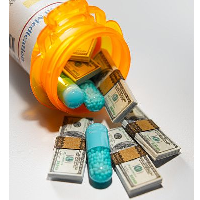FTC Allowed to Stop Brand Drug Firms from Paying Competitors to Keep Generics off Market

Attempts by pharmaceutical companies to keep generic drugs out of the hands of consumers can be challenged in court by federal regulators, the U.S. Supreme Court ruled this week.
The decision affects arrangements known as “reverse payments” or “pay for delay,” in which drug makers pay generic competitors to postpone their rival, non-brand name products from entering the market.
Until now, the Federal Trade Commission (FTC) tried to challenge the deals, only to hit repeated roadblocks in court.
For example, FTC lawyers sued to block Solvay Pharmaceuticals, maker of the testosterone supplement AndroGel, from paying generic-drug maker Actavis an estimated $19 million to $30 million annually for nine years to temporarily block it from selling a generic version of the drug.
But a federal judge dismissed the FTC’s complaint, and the Eleventh Circuit Court of Appeals affirmed the decision, which forced the agency to ask the Supreme Court to weigh in.
In a 5-3 ruling, the high court said the FTC should have been given the opportunity to prove its claims against Solvay.
“In sum, a reverse payment, where large and unjustified, can bring with it the risk of significant anticompetitive effects,” Justice Stephen Breyer wrote for the majority.
Although observers believe that pharmaceutical companies will now be less likely to enter into these kinds of agreements, brand drug firms didn’t view the ruling as a total loss. The reason is that the decision did not hold the reverse payment arrangements to be unlawful, and instead directed lower courts, in judging these cases, to balance whether the benefits of such deals outweigh anti-competitive harm.
The FTC, which estimates that the pay-for-delay deals cost American consumers $3.5 billion per year in higher drug prices, announced that it plans to proceed with litigation, now that it has gotten a green light from the Supreme Court.
So which side really came out ahead as a result of this ruling?
Jeffery Cross, an antitrust expert with Freeborn & Peters LLP, told Reuters that that answer was simple: “The winners here are the trial lawyers.”
-Noel Brinkerhoff, Danny Biederman
To Learn More:
Supreme Court Lets U.S. Regulators Challenge Generic-Drug Deals (by Dina ElBoghdady, Washington Post)
Supreme Court Rules FTC Can Prevent Patent Holders from Paying Rivals to Keep Generics off Shelves (Reuters)
Generic Drugs under Siege by Biotech Firms Out to Reclaim Multi-Billion-Dollar Turf (by Noel Brinkerhoff, AllGov)
Bipartisan Bill Would Charge Fees to Makers of Generic Drugs, Raising More Than $1 Billion a Year (by Noel Brinkerhoff and David Wallechinsky, AllGov)
Delaying Generic Drugs Costs Consumers Billions (by David Wallechinsky, AllGov)
- Top Stories
- Unusual News
- Where is the Money Going?
- Controversies
- U.S. and the World
- Appointments and Resignations
- Latest News
- Musk and Trump Fire Members of Congress
- Trump Calls for Violent Street Demonstrations Against Himself
- Trump Changes Name of Republican Party
- The 2024 Election By the Numbers
- Bashar al-Assad—The Fall of a Rabid AntiSemite






Comments